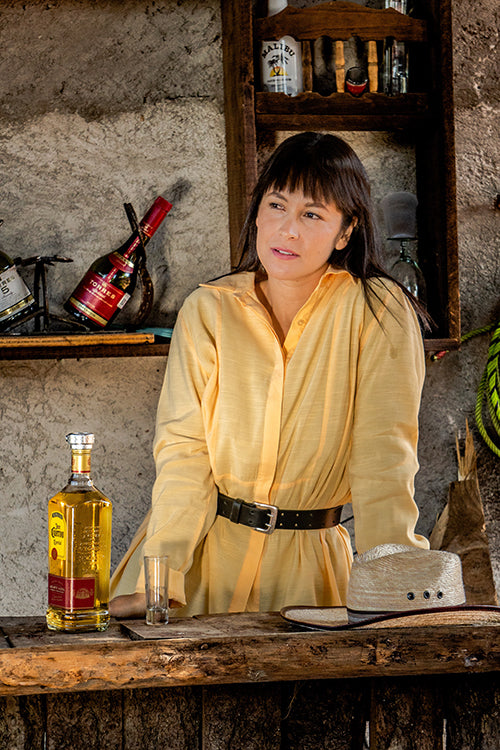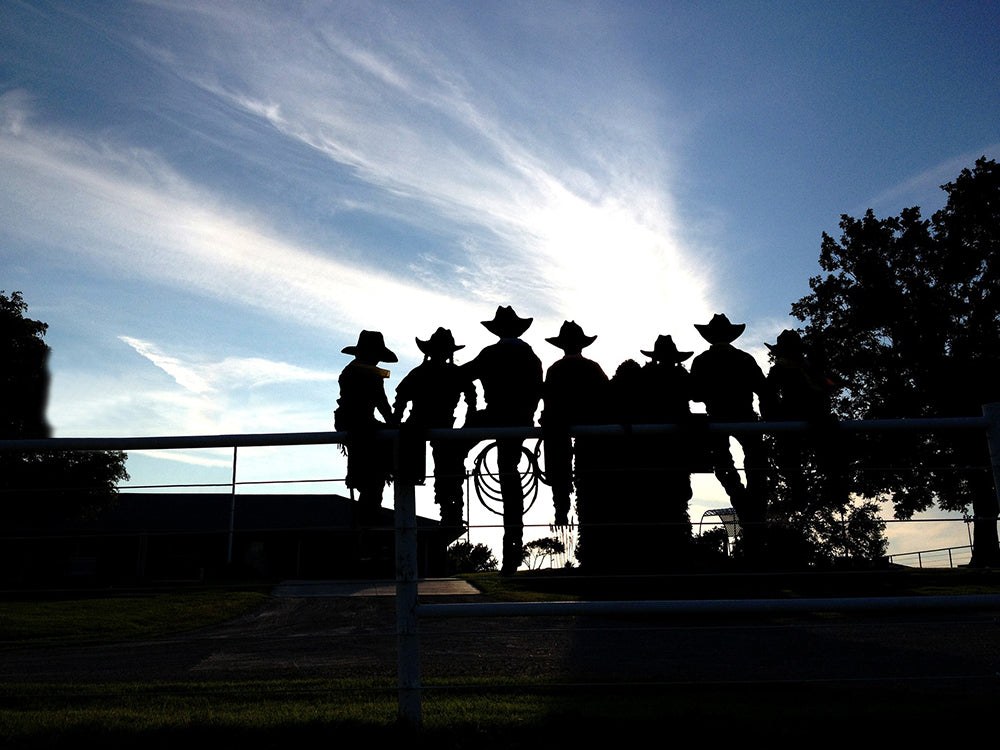
A group of seven boisterous young cowboys all wearing Western hats and boots walked into the bar as I conversed with Lonnie Many Bears. They were covered in sweat and dust.
“Excuse me Lonnie, I’ve got to get their orders,” I said as I walked over with a pad.
“You lads look like you’ve been working hard,” I commented.
“Yah, a truck went off the road overnight and tore up a hundred feet of fencing,” one of them replied, “then a bunch of our cows got out and played havoc with our neighbor’s corn. We fixed the fence and got the cows back in, but in the process, a lot of corn got trampled. This is going to be expensive.”
“That your bike out front?” another one asked. I nodded. “Be careful, the road is covered in cow sh*t about 15 miles south of here. Don’t want you to slide off a turn.” I thanked him.
“How’s the driver of the truck?” I asked – a question that seemed to be of little consequence.
“Don’t know, they hauled him off to the hospital before we got there. His pickup is a mess though.”
“The cops told us who it was but we didn’t recognize his name. Must not be from around here.”
“Hope he has insurance to pay for the damage.”
The cowboys all ordered burgers and beers, then resumed their loud discussion, which made it hard for Lonnie and me to continue our conversation. So, Lonnie decided it was time to go. As he walked out, one of the cowboys who knew him waved him over and asked about a contentious issue of the day.
“Lonnie, you teach history, what do you think about this?” Whereupon he proceeded to explain both sides of a political debate they’d been having.
Lonnie listened, paused awhile to collect his thoughts, and responded.
“Your disagreement is based not on what you know, but on what you’ve heard in the media, Roger. If you think the media is impartial, then you’re going to believe whatever media you prefer and there’s nothing more to be said.
If you look at the big picture, however, you’ll see that there are really only two kinds of government: those that that control the people, and those that are controlled by the people. Authoritarianism has been the default position throughout history.
If those who prefer democracy aren’t willing to fight for it, it’ll eventually turn into another version of authoritarianism. This is always justified through lip service to some higher power or greater good. If there is no resistance, the tendency of centralized power is to turn citizens into subjects.”
With that, he walked out the door.
I was flabbergasted. Even with five years of advanced education, that was the most definitive and concise summary of political theory I’d ever heard. The cowboys must have been impressed too: their chatter stopped.
“Guess there’s not much more to be said on that subject,” I ventured as I brought them their beers.
“Yah, Lonnie is a lot smarter than he looks,” they laughed. “Every once in a while he just stops us in our tracks.”
“Maybe we need to be stopped in our tracks whenever we lose sight of the big picture,” another ventured. They all nodded in agreement.
Melody came out with the burgers. “You can thank Montana that we have enough,” she said. “My family has had to deal with an unexpected problem, so they weren’t available to fetch supplies.”
“You talking about Oliver’s situation?” one of the cowboys asked.
“Yeah, ever since his wife died, he’s had to take care of those kids and the ranch by himself. Doesn’t look like he can handle it. So when he appealed for help, my family went over there to do his housekeeping, repairs, and tend to their animals.”
“You talking about his kids?” one of them laughed.
“Them too, Jake,” Melody added; “They’ve gotten a bit out of control since the death of their mother. Maria tells us they’ve become very hard to handle.”
“Maria is their teacher, right?”
“Yeah, things are tough for them. Oliver has been our neighbor for over 20 years. He’s always seemed so strong and self-sufficient, but her loss has knocked the stuffing out of him.”
“Watching a loved one die will do that.”
“He’ll need to grieve for a while, then he needs to shift his attention to the kids. They’ve lost a parent and the burden of caretaking now falls entirely on him.”
“It’s a good thing your family’s helping out over there, Melody, it’ll lift his spirits.”
“Sure, but why should the burden fall only on my family?” Melody demanded. “You’re his friends too! If you guys spent a couple of hours over there, I’ll bet Oliver’s spirits would be lifted much higher.”
The cowboys looked around at each other. “I know we’ve all got other things to do,” one of them said, “but maybe this should take priority. Oliver would do it for us!”
“I promised my wife I’d get home as soon as possible.”
“Well that’s not possible, Ray, because I’m driving the truck and it’s not going to your place yet.”
“Tell your wife the rest of us threatened to kick your ass if you didn’t volunteer!” another one warned.
“Brenda knows all about Oliver’s problems, Ray,” Melody interjected. “I think she’ll understand if you decide to help Oliver. Do you want me to call her?”

Courtesy of Pexels.com/Heber Vazquez.
“Thanks, Melody.”
“OK then, it’s a done deal,” one of the cowboys exclaimed. “I’m going to buy us a box of beer for coffee break.”
“That’s not going to happen,” Melody objected.
“Why not?”
“Because I’m going to donate the box of beer.”
They all laughed, and headed for Oliver’s place after lunch while Melody and I continued to run the saloon. Ranchers filtered in and out, along with a couple of local bikers. “So glad Sturgis is over and we have the hills back to ourselves.” One of them admitted, “Sturgis is fun but a week is long enough.” I agreed with him.
Melody’s family returned from their humanitarian mission well after dark. They told us over dinner that two of the cowboys worked with them for about three hours that afternoon, and the rest of them worked till well after dark, when everyone quit for the day.
“The arrival of those boys was a nice surprise, Melody,” her dad said. “Thanks for inspiring that. We got a lot more done than I had anticipated, and Oliver can rest easy for a while.”
I got a warm, fuzzy glow on hearing this.
“Couldn’t have done it without Montana,” Melody added.
“You are welcome here anytime,” Dad said. “There will always be a cabin available to you.”
“Thanks, I appreciate that.”
“It must be awful to lose a spouse,” Melody pondered. “Intellectually, people can rationalize the loss but emotionally, it takes a terrible toll.”
Melody’s mom, who seldom spoke and was finishing a rather large glass of wine, had something to say:
“People need to get it in their heads that they never own anything. Everything they have is on loan, like a rental car. Once they understand that, they won’t be so devastated by loss. Nobody cries about returning a rental car, even if they enjoyed it. They move on the next car.
That’s what Oliver needs to do, shift his attention away from his wife and onto his kids before he loses them too.
You have to enjoy whatever’s available while you have it. Everything you think you have, including people, can be taken away from you, so it was never yours to begin with. That includes not only family and friends, but also possessions, health, maybe even your mind. It’s yours to enjoy only for a short time.
You’re not a loser because you’ve lost things, you’re a loser if you try to hang on to an irreversible past. You can’t dwell there. Attachment is the cause of all suffering. You must open yourself up to life’s next gift. If you max out every experience while it’s available to you, you won’t so devastated when you lose it.”
With that, she got up and walked into the kitchen. “I’ll get you guys some pie.”
My jaw must have dropped when I looked over at Melody. “She’s hardly said anything while I’ve been here, and now this? Has she visited the Bhagwan?”
“No,” Melody responded. “She learned her lessons from the school of hard knocks. She lost both of her parents in a car accident when she was 12. She understands loss better than any of us. Now she has a family of her own and is a blessing to everyone else who’s experienced loss. That’s why she’s so treasured by Oliver.”
“Sounds like she’s an unsung hero,” I responded. “The bad actors get all the media attention, but it’s troupers like her who deserve it.”
Header image courtesy of Pixabay.com/April Price.
This series began in Issue 143 and has appeared consecutively in every following issue.



